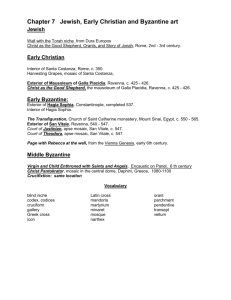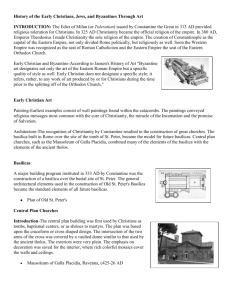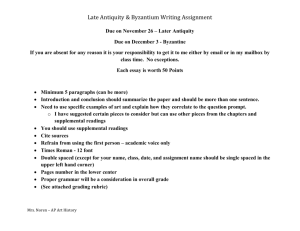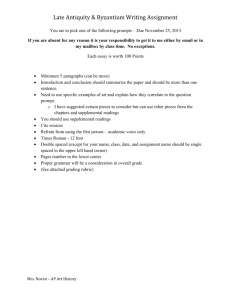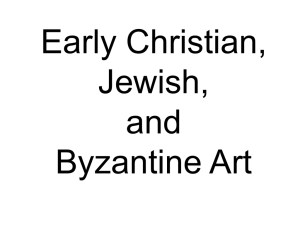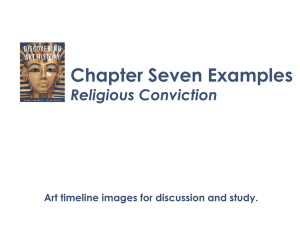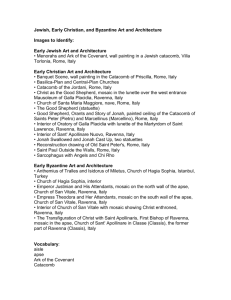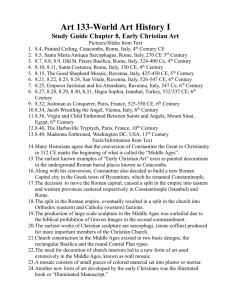chapter7.2013 - WordPress.com
advertisement
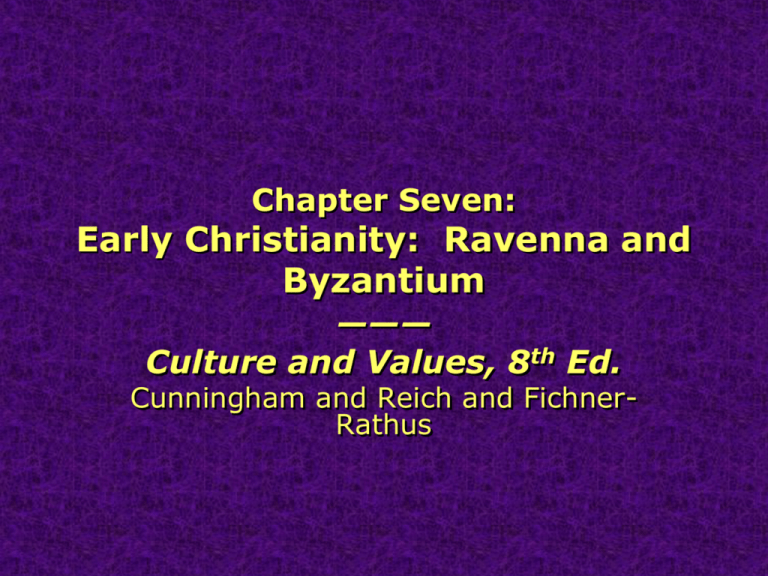
Chapter Seven: Early Christianity: Ravenna and Byzantium ——— Culture and Values, 8th Ed. Cunningham and Reich and FichnerRathus The Decline of Rome • Constantinople : “new” Rome • Geographic advantages • Council of Nicaea • Arian Controversy Literature, Philosophy, and Religion Augustine of Hippo • Bishop of Hippo (390) • Augustinian Premise • Absolute majesty of God • Immutability of God’s will • Flawed state of the human condition • The City of God • Linear history • Confessions • Autobiography, self-reflection Literature, Philosophy, and Religion Boethius • Classical paganism + Christianity • The Consolation of Philosophy • Issues of human freedom • Praevidentia vs. Providence • Plato, Aristotle, Cicero, Augustine Reading Samples In your written response, consider the following: Writing style, Their philosophical heritage, or who they sound like/write like, Issues dealt with, And Statements of belief: theology. Byzantium • • • • • Constantinople Justinian and Theodora Restoration of the Empire Western Silk Industry Revised / Codified Roman Law • Tribonian • Code, Pandects, Institutes • Christian fanaticism • 25+ churches and convents Church of Hagia Sophia • Unified basilica and dome • Pendatives • Ethereal light • Divine Liturgy of St. Chrysostom • Converted to mosque (post 1453) 7.3 Hagia Sophia, 532-537. Constantinople (Istanbul), Turkey 7.4 Interior of Hagia Sophia Ravenna: Art and Architecture • Roman+Gothic+Byzantine • Mosaics of Galla Placidia • Lunettes, apse, dome • Trompe l’oeil • Neonian Baptistery • Octagonal • Mosaics as “theology in color” Mausoleum of Galla Placidia, early 5th century. Ravenna, Italy. 7.6 Christ as the Good Shepherd, 5th century, Lunette mosaic, Mausoleum of Galla Placida, Ravenna, Italy 7.7 Baptisteries of the Orthodox and Arians. Ravenna, Italy Ravenna: Art and Architecture • Arian Baptistery • Severely decorated • Passion/Resurrection of Christ • Church of Sant’ Apollinare Nuovo • Theodoric’s palace church • Basilica style • Rich mosaics (Roman and Byzantine) 7.8 Church of Sant’Apollinare Nuovo, ca. 493-526. Ravenna, Italy 7.9 Miracle of the loaves and fishes. Mosaic from the uppermost register of the nave wall, above the clerestory windows, Church of Sant’Apollinare Nuovo, Ravenna, Italy Church of San Vitale • Octagons, dome, squinches • Program of mosaics • Christ Enthroned • Justinian as Christ on earth (paten) • Theodora with chalice 7.10 Church of San Vitale, Ravenna, Italy 7.11 Christ enthroned, with Saint Vitalis and Bishop Ecclesius, ca. 530. Ceiling mosaic, Church of San Vitale, Ravenna, Italy 7.12 Emperor Justinian and courtiers, ca. 547. Mosaic, south wall of the apse, Church of San Vitale, Ravenna, Italy 7.13 Empress Theodora and retinue, ca. 547. Mosaic, south wall of the apse, Church of San Vitale, Ravenna, Italy Saint Catherine’s Monastery at Mount Sinai • Built by Justinian • Repository of art and culture • Codex Sinaiticus • Vast collection of religious icons 7.15 Aerial view of the fortress of Saint Catherine’s Monastery, 6th century. Sinai Desert, Egypt 7.16 Christ Pantocrator, ca. 500-530. Encaustic on wood panel, 32” x 27” (84 x 46 cm). Saint Catherine’s Monastery, Sinai Desert, Egypt The Legacy of Byzantine Culture • Influence on Russian Culture • Italo-Byzantine Style • Theological conservatism, aesthetic stability (iconography) • Reinfusion of Greek culture • Greek refugee scholars • Classical learning in the Renaissance Chapter Seven: Discussion Questions • Explain the difference in worldview between Augustine and Boethius. What issues were principal to their philosophies? Where did their ideologies overlap? Diverge? • What role did the iconoclastic controversy play in the arts of Constantinople and Ravenna? In light of this controversy, what is the significance of the findings at Saint Catherine’s monastery? • Reflect on the reciprocal relationships between the Byzantine culture (art, religion, politics) and other cultures. What did the various cultures “share” with one another? What is the legacy of this relationship?
![WALKER APAH Work 1: [left] Christ as the Good Shepherd, mosaic](http://s3.studylib.net/store/data/008199063_1-917d961612a5fa9b320b28077d9ae06b-300x300.png)
